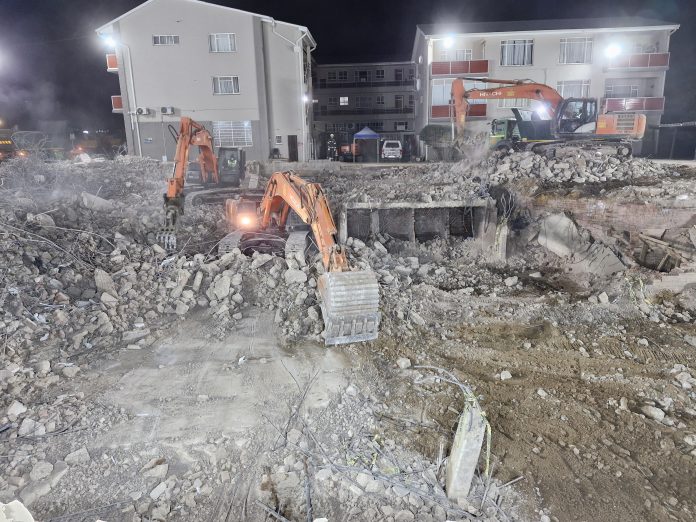The Minister of Human Settlements Thembi Simelane today released the final report by the National Home Builders Registration Council (NHBRC) into the catastrophic collapse of the Neo Victoria residential building in George in May 2024, which claimed 34 lives.
The investigation revealed a cascade of regulatory failures, technical negligence, and oversight breakdowns that contributed to the disaster.
Speaking at a press conference in Pretoria, Minister Simelane emphasized the government’s commitment to transparency and reform.
“We believe in building a capable, ethical, and developmental state,” she said. “We owe it to the families of the deceased and to all South Africans to ensure this never happens again.”
Key Findings of the NHBRC Investigation:
- False Certification by Builder: The contractor misrepresented its capabilities, failing to declare the project as a multi-storey construction, thereby violating NHBRC policy.
- Enrollment Irregularities: The project was unlawfully approved before the builder was officially registered, with staff using others’ credentials to process documents—indicating a collapse of internal controls.
- Flawed Inspection Model: NHBRC inspectors conducted late and inaccurate inspections, even approving units that hadn’t been constructed yet.
- Health and Safety Violations: The site lacked compliance with Occupational Health and Safety (OHS) standards, with no framework in place for NHBRC inspectors to enforce safety compliance.
- Unqualified Personnel: Critical roles were filled by individuals lacking the necessary engineering or quantity surveying qualifications.
- Deficient Technical Oversight: The appointed technical manager’s qualifications were never reassessed, contributing to major technical oversights.
- Engineering and Soil Testing Gaps: The geotechnical report omitted essential data for proper foundation design.
- Unauthorized Construction: The George Municipality approved the plans after construction had already begun.
Recommendations for Reform:
The NHBRC report made a series of sweeping recommendations to prevent future tragedies:
- Clearly specify in registration certificates what types of buildings a contractor is qualified to build.
- Establish an independent peer review panel for high-risk projects.
- Conduct regular skills audits and enforce competency standards for inspectors.
- Implement stringent due diligence during builder registration and project enrollment.
- Require full-time technical manager presence on-site during critical construction phases.
- Ban the use of shared staff login credentials.
- Hold responsible officials accountable for misconduct, negligence, and misrepresentation.
Several NHBRC officials have been suspended and the report has been forwarded to law enforcement for further investigation.
ALSO READ: George building collapse: ‘Criminal proceedings may ensue’
New Housing Consumer Protection Law: A Legislative Overhaul
The release of the report coincides with the enactment of the Housing Consumer Protection Act (Act No. 25 of 2024), signed into law by President Cyril Ramaphosa earlier this year.
This new legislation:
- Introduces stricter registration, grading, and training requirements for homebuilders.
- Establishes a centralized register for monitoring builder performance and disciplinary records.
- Grants inspectors’ statutory authority and outlines qualifications for their appointment.
- Provides for stiffer penalties, including fines up to R1 million and criminal sentences of up to 10 years.
- Empowers whistleblowers and establishes a Compliance and Enforcement Committee to adjudicate non-compliance cases.
Simelane confirmed ongoing investigations into other recent structural failures across the country. “The law only works when enforced. We will do our part, but we call on all stakeholders to work together,” she said.


